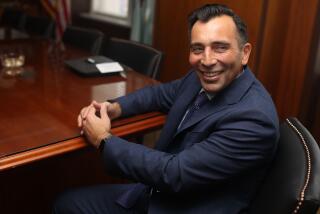Central Figure in Payola Case Breaks Silence : Entertainment: Joseph Isgro hopes that the dismissal of charges will allow him to rebuild his once-thriving record promotion business.
- Share via
Breaking his silence over his recent payola trial, Joseph Isgro--the nation’s best-known record promoter--said he hopes the release of a federal judge’s opinion criticizing government prosecutors’ conduct in the case will erase any “lingering doubts” about his innocence.
Isgro’s remarks came after U.S. District Judge James M. Ideman published a 17-page opinion last month saying the government attempted to prosecute Isgro and two other defendants using a witness whose testimony in an unrelated case “constituted a complete and detailed denial of any wrongdoing . . . by any of the defendants in this case.”
“I certainly think from a legal standpoint I’ve been vindicated” as a result of Judge Ideman’s opinion, Isgro said. “I hope (the opinion) helps stop any lingering doubts.”
Ideman’s opinion was released nearly three months after he abruptly dismissed “with prejudice” the biggest payola case in 30 years, citing “outrageous government misconduct.”
The judge’s “with prejudice” ruling means that the charges against Isgro and defendants Raymond Anderson and Jeffrey S. Monka cannot be refiled unless Ideman’s ruling is overturned on an appeal. In October, prosecutors filed an appeal, but a court ruling is not expected until next year.
Isgro became one of the most powerful and successful independent record promoters of the 1980s when record companies hired his Los Angeles firm to persuade radio stations to play certain songs. Prosecutors had alleged that Isgro gave cash and cocaine to employees at stations in California and Texas in exchange for playing songs he promoted.
But Judge Ideman noted in his written opinion that the government’s key witness, California lawyer Dennis DiRicco, had contradicted many of the government allegations against Isgro in sworn testimony taken in 1988 during DiRicco’s own trial on money laundering and narcotics charges.
DiRicco “denied in sworn testimony” that he was involved in money laundering, that he acquired “cash from drug dealers, denied taking that cash to Isgro personally and denied sending it to him via” an Isgro employee, Ideman wrote. Furthermore, the judge stated, DiRicco “denied conspiring with Isgro or anyone else to commit any crime.”
Since the dismissal of his trial on Sept. 4, Isgro says he has been attempting to re-establish his Burbank-based record promotion business--the Music Group.
Yet Isgro says his business has dropped considerably since the publicity over his trial. As a result, he said, he is focusing more on movie projects, such as the forthcoming film “Jimmy Hoffa’s Story,” with Jack Nicholson and Danny DiVito, as well as the management of recording artists such as Georgio, who was recently signed by RCA Records.
“We have diversified,” Isgro said.
Isgro said re-establishing himself in independent record promotion has been tough.
“I’ve been painted as the bad guy,” he said. “(Yet) I’ve been convicted of nothing. . . . This case has affected me for a good five years and it’s been difficult to put it out of my life.”
Associates and independent observers agree that Isgro has had difficulty regaining the influence and multimillion-dollar income he once enjoyed because of a perception that the case against him fell apart due to a technicality rather than the government’s failure to establish a case against him.
More to Read
The biggest entertainment stories
Get our big stories about Hollywood, film, television, music, arts, culture and more right in your inbox as soon as they publish.
You may occasionally receive promotional content from the Los Angeles Times.









